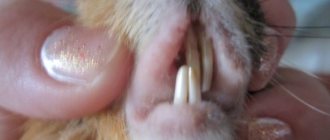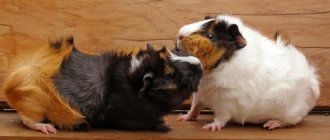- home
- Guinea pig
- Guinea pig behavior
02/06/2019 As a rule, there is always a reason why a guinea pig bites. Pigs (with the exception of some breeds) have lived with people as pets for generations; they do not tend to show unmotivated aggression. The reasons can be both objective and subjective, because each animal has its own character and unique experience of communicating with people. And in most cases, the pet’s behavior can be corrected.
Main causes of bites
A guinea pig bites for a variety of reasons, depending on its personality. If your pet bites when picked up, this may be due to the following reasons:
- Fear of a new person or unfamiliar environment;
- physical pain: the animal was taken incorrectly or it has damage - contusion, bruise, dislocation, etc.;
- desire to go to the toilet;
- fear of heights;
- discomfort from a certain type of affection. For example, a pig may not like having its belly or sides scratched;
- human fingers have a pungent or, conversely, pleasant odor. Do not touch the pig immediately after another animal or after chopping vegetables.
Often pigs show aggression during medical or hygiene procedures: trimming claws or fur, examining teeth or ears, during bathing, injections. In some cases, the pet bites the owner's fingers to show affection and sympathy. In this case, the animal bites easily and painlessly.
You can get a bite if you tear your pet away from an important task: eating, sleeping, washing, mating, etc. If the guinea pigs start a fight with each other, they should be separated carefully: they can jointly attack the “common enemy.” It is better to use gloves when doing this.
Animals of some species bite more often than others (for example, animals of the Kui breed). Before purchasing, you should look for reviews from owners and familiarize yourself with the characteristics of different breeds.
Why does a guinea pig bite?
Most representatives of this breed are friendly. They can bite their owner's finger only for a specific reason.
Bite is the only way to express your emotions and desires. After all, guinea pigs cannot growl like dogs or hiss like cats. The bite is often accompanied by a quiet squeak, which is not always audible.
Through bites, the animal reminds a person of its needs or signals a problem. Aggressive behavior is often caused by stress.
It can be caused by various reasons:
- fear;
- loud sounds;
- careless handling;
- distraction from important matters.
Guinea pigs often bite due to poor health, which was caused by illness or hormonal imbalance (pregnancy, lactation).
Pets express love by lightly biting them. They can also bite if the owner smells appetizing.
If you cannot determine the cause of the bites, you should visit a veterinarian. A specialist will conduct a diagnosis to determine the factors that provoke aggressive behavior and suggest how to eliminate the problem.
Interesting! Kui pigs are naturally aggressive and therefore often bite. This is their genetic feature. People value the meat of these large animals, which is why they breed them. For this reason, Kui fear of humans is passed on from generation to generation.
Why do guinea pigs bite?
There are many factors that cause aggression in rodents, but the main ones are:
- The need to relieve yourself. This is the #1 reason why a pig may bite its owner. Therefore, it is better not to touch the animal at such a moment.
- Appetizing aroma from the hands. Your finger will get bitten if it smells like your favorite food.
- Loud sounds. This is how an animal shows a person that it is scared. Stress and fear can be caused by talking in a raised voice, screaming, sharp knocking, thunderstorms, or the noise of a vacuum cleaner.
- Careless handling. This is another reason why the animal bites. To avoid aggression, you do not need to sharply grab, squeeze the rodent’s body, push it, or carry it at a great height. These rules should be familiarized to children who are often bitten by pets due to careless behavior.
- Fear of man. It happens that a guinea pig falls into the hands of a new owner as an adult. If she is unfriendly and constantly tries to bite people, then perhaps the previous owner treated her cruelly. The current owner must be patient with the guinea pig so that it begins to trust him. Then she won't bite.
- Discomfort or pain. An animal bites if it is in pain due to strong pressure from hands, bruises, wounds, sprains, cracks or broken bones. Such problems often arise during careless play with a pet. Painful sensations also appear due to skin irritation and arthritis.
Additional irritants
In addition to the reasons described above, there are other factors that can provoke a guinea pig to bite:
- Caring procedures. Pets sometimes bite when the owner brushes them or trims their nails. This is how they express their dissatisfaction.
- Untimely cleaning. Often, a guinea pig shows aggression towards a person when he wants to clean the cage at the wrong time.
- Excessive attention. Too frequent or prolonged contact with the owner can also displease the animal, which is why it often bites.
- Inappropriate caresses. You need to know what your pet likes. What some animals love, others cannot stand. But all guinea pigs do not like to have their fecal pouch (the hole between the testicles) touched.
- Feeling lonely. A pet bites if it is left alone for a long time, and then the owner decides to pick it up.
- Fight with relatives. A guinea pig may grab a finger if it is nervous after a conflict with its cagemate. You should not try to separate two pets during a fight without gloves.
- Stranger. These animals bite if strangers try to pick them up or caress them.
- Changes in the usual environment. A guinea pig experiences stress if a person rearranges its cage or moves its home to another room.
- Hunger. If the pet is malnourished, or the portions are too small, then it may bite the owner.
The scale of a possible tragedy and first aid
In most cases, a guinea pig bite is not dangerous. They rarely become carriers of dangerous diseases. But if the animal shows signs of illness or has recently arrived in the house, the likelihood of transmitting rabies or pneumonia increases.
The bite can also transmit diseases such as toxoplasmosis and felinosis. Their main distributors are, as a rule, cats. But there is always a possibility that a recently acquired pig had some contact with cats and could “catch” the virus from them. If the pet lives in the house for a long time and its health is in order, there is no need to fear serious consequences of the bite.
Because of its long front incisors, a guinea pig's bite can be quite painful, depending on how aggressive it is at the time of the attack. If blood appears, the wound is washed and treated with an antiseptic. If there is reason to fear infection (the animal was recently acquired or has had contact with foreign animals and people), you should consult a doctor.
Is it dangerous if the bite bleeds?
Another question that concerns many “victims” bitten by guinea pigs is how dangerous it is. Since we are talking about fairly large animals (the average weight of a rodent is 700–1200 g), with two dozen sharp teeth that are specially designed for grinding hard food, such as branches and tree bark, the bite of such an animal can be very deep and, accordingly, painful .
In general, it is as dangerous as any other injury of a similar nature: it all depends on the size of the violation of the integrity of the skin, the depth of penetration of the teeth, the amount of blood loss, the presence of torn edges of the wound, the likelihood of its contamination, for example, by particles in the cell stale bedding, etc. As a rule, a visual inspection of the consequences of an attack shows that everything is not as scary as it might seem.
Rabies, the only disease with a 100% fatality rate that is truly worth worrying about when bitten by animals, is virtually eliminated in the domestic guinea pig. Some veterinarians even claim that these animals are not carriers of the deadly virus at all, although appropriate vaccination of the animal is still required for transportation abroad. But if the rodent does not directly or indirectly come into contact with street animals, the possibility of rabies can be safely excluded.
Did you know? Guinea pigs are bred not only as ornamental animals, but also as a source of meat. This applies, however, only to one breed called kui: these rodents are much heavier than their counterparts, their weight can reach 4 kg, and, as breeders note, aggression is a “family trait” for them.
Of course, a guinea pig can be a carrier of other diseases, although not fatal, but still unpleasant. Through a bite, in particular, it is possible to become infected with bacterial infections such as toxoplasmosis (caused by Rochalimaea henseale), pasteurellosis (caused by Pasteurella multocida), as well as felinosis (caused by Bartonella henselae), which is sometimes called cat scratch disease, because it is through the teeth and claws of domestic animals, the disease is most often transmitted to humans.
How to deal with biters
Whether your guinea pig bites or not, it is important to remember that physical punishment is not acceptable. They will only make things worse - they will form a negative image of the owner in the animal’s mind, and aggression will increase. Therefore, you should refrain from clicking the nose, slapping, etc.
What you can do to prevent the risk of being bitten:
- Do not put your fingers through the bars of the cage. They are difficult to remove quickly, so in the event of a surprise attack, the limbs are likely to suffer.
- Wash your hands frequently. It is worth washing after communicating with other animals, the smell of which the pig considers dangerous (cats, dogs), after contact with food - having smelled a tasty smell, the animal will confuse its fingers with food and taste them.
- Wear gloves. At least until the frequency of bites decreases.
- Do not hold your pet by force. Perhaps he is uncomfortable or needs to go to the toilet. If the animal breaks out, it is better to return it back to a safe place - to the cage.
The vast majority of guinea pigs do not bite. They are gentle in nature and usually only bite for an obvious reason. Very young guinea pigs learn, explore and test their limits. They can't talk to us. Biting is a very important way of communication. Typically, you need to figure out what your guinea pig is trying to tell you, as it could be something minor that's bothering him or something serious. Knowing the signals will help you and your guinea pig learn from each other and get along better.
6 Reasons Why Your Guinea Pig May Bite You Besides reason #1 (“Put me down… I need to go to the bathroom!”), the most common reasons for guinea pigs biting are listed below.
Mistaken identity Your hands smell like their food pellets: hay, vegetables, fruit, fresh grass, or anything else that just smells delicious. The guinea pig will quickly stop attacking and gnawing when he realizes that it is your finger.
Noise Noise or other disturbance in the immediate area frightens them. This anxiety can be attributed to a thunderstorm, a vacuum cleaner, or a loud TV or stereo system. If something scares your guinea pig and he feels unsafe in your arms, he will... convince you to return him to his cage so he can hide in a safe haven (where he always feels comfortable and safe).
Neglect Guinea pigs want to feel safe. However, if your guinea pig senses that his legs are hanging in the air, or your shoulder is too high, or that he has been pushed too hard, he will let you know. Some guinea pigs don't like it when you walk around the house or up the stairs and show your objections, so they bite you. No guinea pig wants to get into a tug-of-war between two people who want to hold it at the same time. She doesn't like being passed around quickly from person to person.
Fear They are afraid when a person holds them. Guinea pigs will be constantly afraid of a person who is angry or cruel to them, or a person who constantly mistreats them. If the pig's history is unknown to you (for example, you got it from a shelter or found it abandoned on the street), you may have to deal with the consequences that were caused by people before you. A guinea pig that has been abused by, say, little boys may always develop a fear of boys. Love and patience on your part will help relieve this fear, but you will never be able to completely overcome it.
Pain and Discomfort A guinea pig that is in pain does not want to be held. Sources of pain or discomfort may include: bruises, strains or sprains caused by erratic play, skin irritation that is painful to the touch, and arthritis. It should also be noted that sick pigs do not want to be played with.
Mood Sometimes guinea pigs just want to be left alone. Perhaps it's feeding time and they want to focus on the lettuce you just gave them. Perhaps it's time for bed. Maybe her “cellmate” pushed too much and she just wants everyone to have their own place. Perhaps she got excited while playing with her “cellmate.” And perhaps they just don’t want to communicate without special reasons. People, like guinea pigs (although less frequently), have days like this.
Bottom line: Listen and respect what your guinea pig tells you. She hopes you will hear her.
How to Get My Guinea Pig to Stop Biting Me Have you brought a guinea pig into your family? These little creatures make great pets and generally do not bite or attack people. However, other than running and hiding, biting is one of the few defense mechanisms, so it may occasionally occur. According to Teresa Bays's book, Behavior of Exotic Pets: Birds, Reptiles, and Small Mammals, guinea pigs bite to "exert dominance, attract attention, and repel unwanted attention." Your job is to ensure that your guinea pig expects love and kindness from you when he sees you. If you can achieve this, your guinea pig will be more likely not to bite you again.
Method 1. Reducing the risk of being bitten
Photo. Be careful with your guinea pig
1. Take care of yourself. Avoid sticking your fingers through the bars of the cage. If your guinea pig feels threatened, he will attack, making your fingers the perfect target. Don't give her a chance to harm you in any way.
Photo. Wash your hands
2. Wash your hands. Wash your hands to remove any odors that your guinea pig may not like, such as dog or cat odors. Guinea pigs have a keen sense of smell and an instinctive fear of odors, which they associate with danger. Because cats and dogs can pose a threat, they may react negatively to these odors.
In case your guinea pig has a voracious appetite, make sure you wash your hands and remove food odors. You don't want your guinea pig to confuse your fingers with food, do you?
You can wear gloves until you are sure that your guinea pig is no longer biting you.
Photo. Guinea pig in a cage
3. Research the causes associated with guinea pig bites. Biting is primarily related to fear, but there are several other biological and environmental reasons for this behavior.
Bites may cause pain. You may harm your guinea pig or there may be a deeper physiological problem. Sometimes guinea pigs will bite you when they want to bite. This may be an indicator of ticks or fleas. If discomfort or pain is causing her concern, contact your veterinarian immediately.
If your pig chews or bites while you hold him, he may need to pee. So, if that's the case, put him back in the cage and see what he does. If the pig urinates, you've got your answer.
Unneutered male guinea pigs may exhibit dominance by biting more often than females or spayed males. Consider spaying your guinea pig. However, there is no guarantee that neutering will completely stop biting. Dominance is not based solely on testosterone levels.
If your guinea pig is biting the bars of its cage, it could mean that the animal is lonely and wants attention. It may not be that dangerous, but it is worth considering. Handle it with care.
Method 2: Find common ground with your guinea pig
Photo. Protect your guinea pig from other factors and animals
1. Remove other factors that cause anxiety. The guinea pig cage in your home should be placed in a quiet area to minimize stress on the animal. If your guinea pig bites, he most likely feels threatened. Turn off the TV. Place other pets, if any, in another room. Do you want your guinea pig to focus only on you? Then you should behave well and your guinea pig will give you a pleasant experience rather than a stressful one.
Photo. Open the cage door
2. Let your guinea pig explore his space. If you have just brought your guinea pig home, it will take some time for him to get used to his new home, cage and the room in which the cage is located. Let your guinea pig acclimate. Don't start playing with your guinea pig right away.
Unlock the cage and let her explore. It is important to let your guinea pig explore on his own. Once he knows his space and where good hiding spots are, she will feel more comfortable.
Once your pig is more relaxed, give him time to explore. Do this when it is quiet, making sure there are no loud noises or other pets. Place fresh greens on the cage door and outside the cage to stimulate it. Don't push. Every guinea pig is different and will take some time.
Photo. Sit with a guinea pig cage
3. Slowly introduce her to the environment. Speak without trying to entice the pig. Sit next to the cage. Talk to her calmly. Place tasty greens such as parsley or dandelion nearby. Wait until your pig becomes more comfortable before petting him. Eventually, you can put your finger up and let her explore your scent. Do not make contact until the animal feels comfortable.
Simply sit and read or watch TV (quietly) next to the cage while your pig gets used to your presence. Loud noises will frighten your guinea pig, so release it when the house is quiet and there are no dogs or cats around.
Photo. Touch the guinea pig
4. Gradually work on cuddling your guinea pig. Make the first physical contact for a short time. Do not grab or hold your guinea pig against its will. Once your guinea pig accepts your hand in the cage, pet your guinea pig gradually and gently for a few seconds at a time. Try petting her behind the ears and on top of her head. Only after she is comfortable in such an environment, caress her. Pick it up off the floor and then put it down immediately. Work on it so she doesn't get used to it.
When you pick up your pig, use one hand to wrap around its chest and the other to support its rear end. Your guinea pig should feel completely supported so he won't worry about falling. Start by sitting on the floor. Pick it up and pet it. Keep calm. If your piggy is agitated, put your piggy back before he feels the need to defend himself with his teeth.
Photo. Teach children how to pick up a guinea pig correctly
5. Teach children how to hold guinea pigs correctly. Remember that gnawing or biting is a way of expression in guinea pigs. If your guinea pig feels uncomfortable being held by your child and resorts to biting, tell your child to put the pig down immediately.
Under your supervision, have the children sit on the floor with a towel to hold the guinea pig. This way, there is an obstacle between the baby and the guinea pig, which will protect both. Ask your child to gently pet your guinea pig and let him walk around so he doesn't feel trapped.
Photo. Treat your guinea pig
6. Give treats to reinforce good behavior. Don't reward bad behavior. If your guinea pig seems to be biting to get your attention, don't reward the behavior. Come back later and pet your pig when he's calm. You will need to learn to read your piggy's body language and if he is calm, pet him and reward him for this behavior. To try to stop her from biting, you need to link biting and bad behavior together.
Photo. Don't disturb a sleeping guinea pig
7. Get to know your guinea pig's personality. After a few months of living together, you will begin to notice your guinea pig's habits. Try not to disturb your pig while she's sleeping to reduce the chance of a negative reaction to your attention.
Photo. You can't hit a guinea pig!
8. Don't hit your guinea pig! This may hurt the pig, but it will also teach the pig that it needs to defend itself from you, which will lead to more bites. After being bitten, you may want to pounce on her. Don't give in to this instinct. Consider why your guinea pig resorted to biting and change your behavior.
This entry was published on Thursday, June 15, 2022 - 2:44 pm. You can leave a comment.
Teaching proper manners
If your guinea pig bites, it should be weaned off. It is difficult to train these animals, but it is possible if you are patient and use the right methods. There is a simple training that can help “retrain” biting pets. A finger is placed on the bars of the cage. If the animal shows aggression and tries to attack, the finger is removed and a firm “no” or “no” is pronounced out loud. Speak calmly, without raising your voice. Before the second attempt, the pig is given a treat. If after this the attack is repeated, the owner again says “no” and, after showing the pet a treat, demonstratively removes it. The main goal of the training is to reinforce the animal's friendly behavior with tasty food.
Other methods are aimed at eliminating, if possible, all the factors that cause the animal to bite. These factors include:
- Cell location. The cage should be placed away from the source of loud sounds and stress - TV, computer, window, other animals, if any.
- Unfamiliar territory. If the pig was recently acquired and has not had time to explore the surrounding space, it needs to be given frequent walks around the room, without disturbing it or rushing it. After she explores the new house, it will no longer seem dangerous.
- Lack of attention. Often pigs do not have enough care, because they are sociable animals. What you should not do is encourage this method of attracting attention. It’s better to pet and treat her later, when she’s calmed down. It is important not to create a connection in the animal between the bite and caress.
- Fear of people. The animal must get used to the owner. To do this, it is enough to spend some time near the cage every day - reading, watching TV at low volume. It is useful to talk calmly and softly to your pet, so he will get used to the owner’s voice.
- Physical contact. If your pig is scared when picked up, you need to train him to do so slowly and gradually. First, pet the pet in the cage, then try to pick it up for a while. Over time, the duration of contact increases. It is important to hold the animal tightly so that it feels stable and is not afraid to fall: clasp the body at chest level with one hand, and support the hind legs with the other.
What to do if your guinea pig bites
First of all, you need to understand that the pet most often does this for a specific reason (fear, illness), and not because of its harmful nature. He should be put back in the cage and try to find out the reason for the aggression.
Important! It is prohibited to punish a guinea pig that bites. This will only aggravate the situation and increase the pet’s mistrust of the owner.
You should be patient, especially if the animal has recently moved into your home. You need to give him time to get used to the new place, and also understand that the owner does not pose a threat.
If your pet's behavior suddenly becomes aggressive, you need to observe him to identify the cause of the change.
Important! A bite from an infected guinea pig can lead to pneumonia, benign lymphoreticulosis (felinosis), rabies, and toxoplasmosis. Therefore, the injured area should be immediately washed with warm water and antibacterial soap and treated with an antiseptic solution. If the owner is not sure that the pet is healthy, you need to consult a doctor.
Reduce the risk of being bitten
There is an opinion that through a bite a guinea pig shows a desire to dominate and attracts attention.
To reduce the likelihood of aggression, it is advisable to follow these rules:
- You should not stick your fingers into the animal’s cage through the bars. This will scare the guinea pig.
- Before contacting the animal, you need to wash your hands with soap that has a neutral odor. This should be done especially after communicating with a cat or dog, which the guinea pig perceives as enemies. You should do the same if your fingers smell of the animal’s favorite food.
- If a guinea pig has recently arrived in the house, you should only handle it with gloves.
- If your pet is acting aggressively, but the reason is unknown, a visit to the veterinarian is necessary.
- The most drastic measure to reduce the risk of being bitten by a guinea pig is sterilization. However, some individuals continue to bite even after this procedure.
- Guinea pigs bite the bars of their cage when they are lonely.
- You cannot distract your pet from feeding, urinating, defecating, sleeping and other important matters.
In most cases, the animal bites out of fear, so the owner must be as patient and careful as possible with the pet.
What to do if bitten by a guinea pig
To wean an animal from biting, you need to follow this plan:
- Eliminate irritating factors. Place the cage with the pet in a quiet, calm place where there are no other pets. Talk to her in a quiet voice, move smoothly.
- Allow the new animal to explore the surrounding space (cage, room) alone, without disturbing it, or trying to play with it. Let your pet find a possible hiding place to feel more confident.
- While the guinea pig is getting acquainted with its new home, you need to maintain silence and remove other animals from the premises.
- To encourage the animal to explore its new home and surrounding space, you need to place treats (vegetables, herbs) near the cage doors and around it.
- Talk to your pet in a quiet, affectionate tone when he has already become a little familiar with his new home. Gently let him sniff your finger.
- If the pet is ready for contact, you need to open the cage, wait until he comes out, and let him sniff your hand. Then lower it, and after a while pick it up again. You should not hold the animal against its will, otherwise it will bite.
- The rodent must be held correctly: hold it around the chest with one hand, and support it from below with the other.
- If your guinea pig is acting friendly, you can give it a treat. If she bites, it’s better to put her in a cage and tell her in a stern tone that you can’t do that.
To wean a guinea pig from biting, you need to be patient - provide it with proper care, attention, and care. Under no circumstances should you hit the animal, otherwise it will defend itself even more zealously.
If a guinea pig bites, you should put it in a cage, treat the wound and try to find the cause of the aggression.
Discomfort and behavioral characteristics
It is usually the owner who creates discomfort for the animal. For example, careless handling of a pig will cause the animal discomfort and may bite in response. If a conflict occurs between several individuals and at this moment the owner tries to intervene, then there is a possibility of getting bitten. An animal may perceive human hands as another danger and attack them. It is not very easy to separate animals that fight not very easily, not even with bare hands; their sharp teeth can get material.
When you get a guinea pig as a pet, give it time to get used to its new surroundings. The first days it is better not to let him in, let him be alone with himself more, let him get used to the surroundings, smells, sounds and people living in the house. If you decide to immediately look at the animal in your hands and try to play with it, then it may bite you, giving a defensive reaction. When you acquire an aged individual, you don’t know what kind of character it will have and how it will behave. The animal may have a bad experience with previous owners, it may be frightened, it may be a defensive reaction and therefore the animal may bite for the purpose of self-defense and lack of trust. A pet store is unlikely to provide you with reliable information about your pet’s past life.
Violation of personal space
One of the most common reasons when animals use their teeth is some discomfort experienced by the pet. These include the following types of inconvenience:
- Restricting the animal's movements against its will - this often happens during treatment, for example, when giving medicine or giving an injection. True, there are also children who stoically endure unpleasant manipulations without causing harm to the person.
- Grooming (combing, bathing, examining the external condition, trimming claws, and so on). Most often, “biting” is exhibited by those pets who have not been accustomed to this type of care since childhood and may experience fear during what they consider to be painful procedures. Naturally, the animal will begin to defend itself, and teeth are the most suitable means of self-defense in this case.
- Actually, a violation of personal space when the owner tries to clean the cage at the most inopportune moment. By the way, many pets love to rake all the bedding under them, sitting with their fifth point on the bare rods. At the same time, any attempt on the part of a person to correct the uncomfortable, in his opinion, position of the rodent is met with a furious rebuff: some pigs “growl” in warning, while others angrily resist, and strive to bite the troublemaker.
- The animal is unhappy that it was picked up, squeezed, and not allowed to run around and enjoy freedom. At the same time, the pet becomes irritated and shows its displeasure with what is happening by biting.
- A guinea pig can also experience discomfort if it is handled incorrectly: some babies do not like scratching their belly, neck or ears, others become hysterical when their rump or fecal pocket is touched.
A rodent has bitten until it bleeds: what to do?
The situation when a domestic rat bites until it bleeds is alarming. This is not surprising, because history records so many diseases that were spread by rats. It was easy for rodents to bite a sleeping person and infect him with a deadly infection.
Decorative rats are not basement parasites. There is much less infection in their bodies. However, after a bite, you cannot stop the bleeding for some time so that all the bacteria that have entered it have time to get out. Next, the resulting wound is washed with a soap solution, for the preparation of which it is preferable to use laundry soap. Afterwards, the bite is treated with an antiseptic, and the edges are cauterized with iodine.
After being bitten by a rat until it bleeds, you will have to consult a doctor for vaccination against viruses that can infect your pet rodent.
Why does the pig bite
Pets that live in close contact with people do not become aggressive without cause. Fluffy rodents are good-natured and peaceful. The owners note that the animals are sociable and playful, but they also tend to bite.
reasons for the bite
Why an animal bites is determined by familiarizing yourself with the factors that are responsible for the pet’s behavior.
Kevi bites against the background of mental manifestations.
- Getting used to a new home.
- Negative experience with the previous owner.
- The smell that comes from the hands, which is similar to the aroma of a delicious treat.
- Reacting to someone else's hands - not all guests are able to hold the animal in their hands.
- The presence of legs and arms as an obstacle, an enemy for the pig, especially during fights with relatives.
- Kevi shows tenderness in this way - by tenderly and painlessly biting its owner, the animal expresses affection and love.
It is dangerous to disturb an animal’s space when it is busy with important things – sleeping, eating, and performing hygiene procedures. So, the bite will not be long in coming.
The pet feels discomfort or pain:
- in case of excessive pressure on the body;
- when scratching prohibited areas.
When a porpoise is not feeling well, any irritant will bite. This also applies to females who are carrying offspring, are close to giving birth, and performing medical procedures on pigs to cure them.
reasons for aggression
A sick kewi should be given peace and quiet. It happens that the owner does not see signs of the development of the disease and, out of habit, picks up the furry inhabitant. Then there is nowhere to hide from the bite.
If the pet has not bitten before, and the list of reasons provided does not fit the description of the animal’s behavior, then it is taken for examination.
What can happen after a bite
If the guinea pig is healthy, then nothing dangerous will happen. But if she is sick, then it is better to immediately consult a specialist.
You can get diseases from mumps such as:
- Toxoplasmosis is the transmission of parasites from mumps (this, fortunately, is rare).
- Pneumonia - you can get a severe form of this disease from it.
- Felinosis is the so-called cat scratch disease, but the source of infection can also be a rodent.
- Rabies is, of course, unlikely, but if the pet has recently appeared in the house, then you should definitely get it checked.
And, of course, a guinea pig bite can cause very severe pain. After a bite, you should immediately wash the wound, use an antiseptic and bandage your finger. If necessary, go to the doctor.
What makes a rat bite
Rats don't bite for no reason. A rather banal situation can motivate one to “taste” one’s owner or relative, for example:
- The rodent was hurt.
- The animal is scared.
- The animal is experiencing severe hunger.
- The animal wants to attract the owner's attention.
Such incidents are isolated, rare, and do not require urgent action. There is also no need to panic when a rat bites in a cage or bites its relatives. In nature, rodents use biting as a way of communication; they use it to express their dominance and communicate. Under normal circumstances, this does not cause pain to the “neighbors” and leaves no wounds.
Pets can bite when physiological processes occur in the body. At this time, a certain change in character occurs. If you provoke your pet and allow him to bite, it will develop into a habit.
Causes
There are some typical situations that lead to bites. Conventionally, they can be divided into:
- inconvenience,
- health status,
- expression of feelings,
- protection of the territory.
If problems arise with the health of the animal, then it may show some aggression when you try to pick up the rodent. If this situation repeats itself over the course of several days, it would be best to show the animal to a veterinarian.
Aggression towards a stranger can occur when the owner changes or when the female is pregnant. In both cases, the animal protects its territory from encroachment.
Light bites can be a sign of affection towards the owner. In the same way, the pig shows love to its relatives.
Inconvenient for the rodent
But situations with inconvenience are very diverse. A guinea pig bites when its freedom of movement is restricted. An example would be forcibly holding an animal during treatment. Any actions that are performed by force will be met with hostility by the animal. These may include, for example:
- Examination of the mouth.
- Bathing.
- Claw trimming.
- Pulling from a nest or from a bowl of food.
But that's not all. Perhaps the reason is that you are incorrectly picking up the animal:
- you grab it sharply,
- squeezing too hard
- take it from above.
Dehydration, hunger, the desire to do toilet chores are also causes of bites.
The behavior of the animal is also influenced by stress factors. If a pig bites, it could be due to prolonged loneliness and lack of attention. It may also be that the previous owner caused pain to the animal. Even if this was not done intentionally, but simply from the desire to cuddle.
If you suddenly approach the cage and put your hands into it, the animal may become frightened and begin to attack you, mistaking you for an enemy. In this case, a bite is also likely.
Funnier reasons are also possible. For example, you cut greens or fruits. Your fingers and palms absorbed the scent. And the pig decided to try the treat. Another variant of biting behavior occurs when you decide to break up fights between several pigs. Then they will unite against you.











